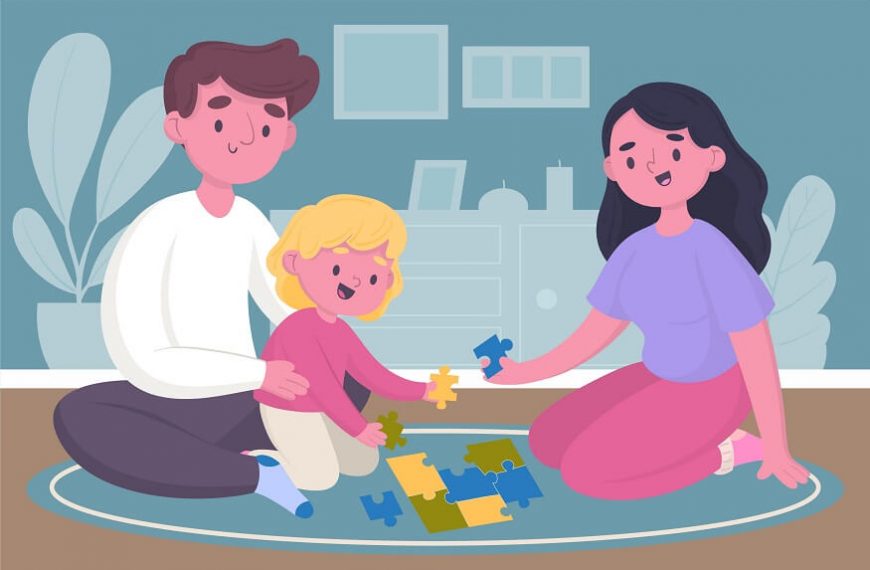Positive Parenting Tips for Toddlers: Nurturing, Communication & Boundaries
Positive parenting is an approach that emphasizes building a solid and loving relationship with your child while promoting their social, emotional, and cognitive development. Here are some essential parenting tips that every parent should adopt:
- Create a Nurturing Environment: One of the most basic parenting tips is to provide a safe and nurturing environment where your child feels loved, supported, and valued. Offer plenty of affection and positive attention.
- Be a Role Model: Demonstrate the behaviors and values you want to instill in your child. Children learn by observing their parents, so model the traits you want to see in them.
- Use Positive Reinforcement: A parenting tip for early childhood is to praise and reward your child’s positive behavior and efforts. Positive reinforcement encourages them to repeat these behaviors and builds their self-esteem.
- Set Clear and Reasonable Limits: Establish clear and age-appropriate rules and boundaries. Communicate these expectations calmly and consistently.
- Practice Effective Communication: Listen actively to your child and communicate with empathy and understanding. Encourage open and honest dialogue.
- Offer Choices: Give your child opportunities to make age-appropriate choices. This empowers them and fosters decision-making skills – a parenting tip that can never go wrong.
- Use Positive Language: One of the most significant parenting tips for toddlers is to frame instructions and feedback positively and constructively. Avoid using negative language that may discourage your child.
- Encourage Independence: Support your child’s efforts to be independent and self-sufficient. Allow them to take on age-appropriate responsibilities – a must to have parenting tips for toddlers
- Manage Emotions Responsibly: Model emotional regulation and help your child understand and express their emotions healthily.
- Avoid Punishment and Physical Discipline: Instead of punishment, focus on natural and logical consequences to teach lessons. Avoid physical discipline, as it can harm and harm the parent-child relationship.
- Practice Active Listening: Show genuine interest in what your child has to say. Active listening helps strengthen your bond and encourages open communication.
- Be Patient and Flexible: Recognize that parenting can be challenging, and children may not always behave as you expect. Be patient and adapt your approach when needed.
- Stay Calm in Conflict: When conflicts arise, remain calm and composed. Address the situation calmly and respectfully, focusing on finding a solution.
- Spend Quality Time Together: Dedicate quality time to engage in activities that foster a strong bond between you and your child. These shared experiences create lasting memories.
- Prioritize Self-Care: Take care of your own physical and emotional well-being. A well-rested and emotionally balanced parent can better support their child’s development.
- Seek Support and Resources: Don’t hesitate to seek parenting support through books, workshops, or support groups. Positive parenting tips for toddlers can be challenging, and resources are available to help you navigate it.
Remember that positive parenting tips for toddlers evolve as your child grows. It’s about building a loving and supportive relationship and empowering your child to become a confident, empathetic, and responsible individual.
Positive parenting tips for toddlers focus on building a solid and nurturing relationship with children while promoting their emotional, social, and cognitive development. It emphasizes using positive reinforcement, effective communication, and empathy to guide children’s behavior and foster their overall well-being. Parenting tips for preschoolers are based on the belief that children respond best to love, understanding, and encouragement rather than punishment and harsh discipline.
Parenting tips for preschoolers include:
- Nurturing and Responsive: Positive parents are warm, encouraging, and responsive to their child’s needs. They provide a secure and loving environment where the child feels safe and valued.
- Positive Reinforcement: Positive parenting uses praise, encouragement, and rewards to reinforce positive behavior. It focuses on acknowledging and appreciating the child’s efforts and accomplishments.
- Clear Boundaries: Positive parents set clear and age-appropriate boundaries for their children. They communicate expectations calmly and consistently, providing structure and predictability.
- Effective Communication: Positive parenting emphasizes active listening and open communication between parents and children. Parents strive to understand their child’s feelings and thoughts, promoting a healthy parent-child relationship.
- Empathy and Understanding: Positive parents practice compassion and understanding, recognizing their child’s emotions and validating their feelings. This helps the child feel emotionally supported and understood.
- Conflict Resolution: Positive parenting teaches children problem-solving skills and effective conflict-resolution strategies. Instead of resorting to punishment, parents encourage children to find solutions to conflicts.
- Modeling Behavior: Positive parents model the behavior and values they want to instill in their children. They are aware that children learn by observing their parents and caregivers.
Why positive parenting is essential in childhood:
- Healthy Attachment: Positive parenting nurtures a solid and secure attachment between parents and children. This attachment forms the foundation for the child’s emotional development and relationships.
- Self-Esteem and Confidence: Positive reinforcement and praise build a child’s self-esteem and confidence. When children feel valued and appreciated, they develop a positive self-image and believe in their abilities.
- Emotional Regulation: Through empathy and understanding, positive parenting helps children learn to regulate their emotions and express themselves healthily and constructively.
- Social Skills: Positive parenting fosters positive social interactions. Children raised with warmth and support are more likely to develop empathy, compassion, and practical communication skills.
- Cognitive Development: A nurturing and encouraging environment supports a child’s cognitive growth. When children feel emotionally secure, they are more receptive to learning and exploring the world around them.
- Behavioral Development: Positive reinforcement and clear boundaries promote positive behavior and help children develop self-discipline and self-control.
- Resilience: Positive parenting teaches children how to constructively cope with challenges and setbacks, fostering resilience and adaptability.
Parenting tips for preschoolers create a loving, supportive, and emotionally healthy environment for children to grow and thrive. It lays the groundwork for their emotional and social development, shaping them into confident, caring, and well-adjusted individuals.
At Eurokids, we understand the efforts parents put into using positive parenting. We ensure when your little one is at preschool, we give them the same environment to grow and develop. Click here to learn more, or visit a Eurokids center for preschool admission.

















